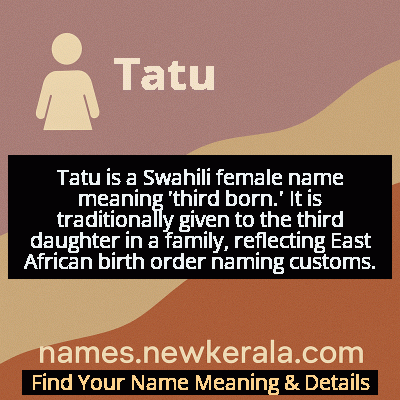Tatu Name Meaning & Details
Origin, Popularity, Numerology Analysis & Name Meaning of Tatu
Discover the origin, meaning, and cultural significance of the name TATU. Delve into its historical roots and explore the lasting impact it has had on communities and traditions.
Name
Tatu
Gender
Female
Origin
African
Lucky Number
8
Meaning of the Name - Tatu
Tatu is a Swahili female name meaning 'third born.' It is traditionally given to the third daughter in a family, reflecting East African birth order naming customs.
Tatu - Complete Numerology Analysis
Your Numerology Number
Based on Pythagorean Numerology System
Ruling Planet
Saturn
Positive Nature
Ambitious, efficient, realistic, and authoritative.
Negative Traits
Materialistic, stressed, confrontational, and can be overly ambitious.
Lucky Colours
Dark blue, black.
Lucky Days
Saturday.
Lucky Stones
Blue sapphire, amethyst.
Harmony Numbers
2, 4, 6.
Best Suited Professions
Business leaders, managers, financial services, law enforcement.
What People Like About You
Leadership, determination, organizational skills.
Famous People Named Tatu
Tatu Msangi
Educator and Community Leader
Founded educational programs for girls in Tanzania and promoted women's literacy initiatives
Tatu Mwandazi
Musician
Popular Taarab singer known for blending traditional Swahili music with contemporary sounds
Tatu Kamau
Environmental Activist
Led reforestation projects in Kenya and advocated for sustainable agricultural practices
Tatu Nyerere
Political Figure
Women's rights advocate and community organizer during Tanzania's independence movement
Name Variations & International Equivalents
Click on blue names to explore their detailed meanings. Gray names with will be available soon.
Cultural & Historical Significance
The name also embodies the rich oral traditions of Swahili culture, where names are not merely labels but carry stories, hopes, and cultural values. During the era of the Swahili Coast city-states, names like Tatu helped maintain cultural identity amid diverse influences from Arab, Persian, and European traders. Today, the name continues to represent cultural continuity and the preservation of African naming traditions in an increasingly globalized world, serving as a reminder of the importance of maintaining cultural heritage through simple yet meaningful practices like traditional naming conventions.
Extended Personality Analysis
Women named Tatu are often perceived as natural mediators and peacemakers within their social circles, a trait that aligns with their traditional role as the third-born child who bridges the gap between older and younger siblings. They typically exhibit strong diplomatic skills, emotional intelligence, and the ability to see multiple perspectives in conflicts. This positioning in the birth order often fosters adaptability and resilience, as they learn to navigate relationships with both older authority figures and younger dependents from an early age.
Many Tatus develop a balanced approach to life, combining the wisdom gained from observing their older siblings with the fresh perspective often associated with younger family members. They tend to be excellent communicators who value harmony and cooperation, yet they also possess a quiet determination and independence. Their experiences growing up typically equip them with strong organizational skills and the ability to manage complex social dynamics, making them effective leaders who lead through consensus rather than authority. This unique blend of traits often makes Tatus valued members of their communities, workplaces, and families.
Modern Usage & Popularity
In contemporary times, the name Tatu maintains its traditional significance while adapting to modern naming trends. While still predominantly used in East African communities, particularly in Tanzania, Kenya, and parts of Uganda, the name has gained some international recognition through diaspora communities. Its usage remains relatively stable rather than trending, as it's primarily chosen by families wishing to honor cultural traditions and birth order naming customs. However, there's a growing appreciation for African names globally, and Tatu occasionally appears in multicultural contexts outside Africa. The name continues to be most popular among families with Swahili cultural connections, though some parents now choose it for its pleasant sound and cultural richness rather than strict adherence to birth order traditions.
Symbolic & Spiritual Meanings
Beyond its literal meaning of 'third born,' Tatu carries rich symbolic significance representing balance, continuity, and connection. The number three itself holds symbolic weight in many African cultures, often representing harmony, completeness, and the cycle of life. Tatu symbolizes the bridge between generations and the continuity of family legacy. Metaphorically, the name suggests someone who connects different elements - whether people, ideas, or traditions - and helps create unity from diversity. It also represents the idea of growth and progression, as the third child often marks the point where a family transitions from a couple with children to a established family unit. The name embodies the concept of cultural preservation through simple, meaningful traditions that connect individuals to their heritage and community.

